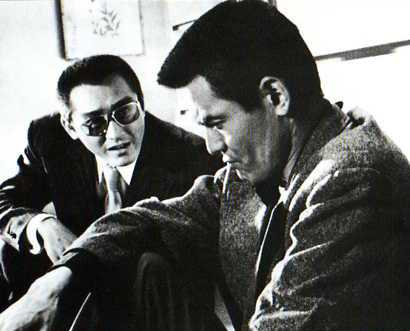Film buffs and Japanophiles delight: The Japan Times ran a great article by film reviewer Mark Schilling about lines in various yakuza flicks, using some solid classics like the Jingi series and Tokyo Drifter as fuel:
Another immortal Takakura line was one he delivered just before he and Ryo Ikebe were about to 殴りこみ(nagurikomi, invade the headquarters of a rival gang) in Kosaku Yamashita’s 「緋牡丹博徒」 (“Hibotan Bakuto,” “Red Peony Gambler,” 1968): 「所詮、俺達の行く先は赤い着物か、白い着物」 (“Shosen, oretachi no ikusaki wa akai kimono ka, shiroi kimono ka“; “After all, we’re bound for either a red kimono [worn by prisoners] or a white kimono [worn by the dead].”)
This stoic view of life extended to affairs of the heart. In Seijun Suzuki’s 「東京流れ者」 (“Tokyo Nagaremono,” “Tokyo Drifter,” 1966), Tetsuya Watari, whose character has become a hunted outcast after killing his duplicitous boss, must say farewell to his nightclub singer girlfriend, played by Chieko Matsubara. Before departing, he tells her 「流れ者に女はいらない、女がいちゃ歩けない」 (“Nagaremono ni onna wa iranai, onna ga icha arukenai“; “A drifter doesn’t need a woman. If a woman’s around he can’t walk”).
Read the full article here.
Besides being awesome, yakuza films are, like mafia movies, massively important in defining how the Tanaka Taros imagine their country’s underbelly–right down to the trill of growled Hiroshima-ben. While there’s not a huge opportunity to fit something like “死んでもらいます” (shinde moraimasu–“Excuse me, I will now have you die”) into a chat with the local combini staff, it makes for great party chit chat… amongst your yakuza movie-obsessed friends. Or if anyone’s in the NYC area during March and wants to try out a few lines on Jake at the Onibi screening, I’m sure he’d appreciate it. 😉
Jake: The yakuza movies have great lines. The 1970s classic, The Yakuza with Takakura Ken and Robert Mitchum, had a great tag line: “A man never forgets. A man pays his debts.” It beautifully captures the emphasis on reciprocity in yakuza society.
The yakuza have some pithy words and phrases in daily life as well. 「お礼参りさせていただます」 (o-rei-mairi sasete itadakimsu-“Allow me to pay my respects.” That’s actually polite shorthand for “I’m coming to extract vengeance.” It’s so polite and yet so menacing and hard to classify as a threat. Or the famous words of one Inagawa-kai boss to his soldiers. 「浚われた時は、命がないと思え」(sarawareta toki wa, inochi ga nai to omoe) “If you get kidnapped, think of yourself as already dead.” It’s the yakuza version of “we don’t deal with terrorists” . In practical terms it meant that when one of his soldiers got kidnapped in a gang war, they wouldn’t pay ransom for him or negotiate but they’d extract three times the damage in revenge to the opposite side.
And finally, of course, one of my favorites which I’ve found to be personally true: 「窮地で初めて男の真価がわかる」(”kyuchi de hajimete otoko no shinka ga wakaru”; “It is when a man is placed in a tough situation that we first know his real worth.”) And of course, the motto of the old school yakuza that are fading out very quickly. 「裏切られるのも耐えろ。人を裏切っちゃいけない。人を裏切ったら誰も信用できなくなり、ヤクザとして勤まらん」(“uragirareru no mo taero. hito wo uragicha ikenai. hito wo uragichattara dare mo shinyo dekinaku nari, yakuza to shite tsutomaran” ; “If you’re betrayed, endure. Never betray others. If you do, you won’t be able to trust anyone and you can’t live as a yakuza.”)
Also, don’t forget to check out our growing Yakuza Dictionary, and make your own suggestions!

[…] This post was mentioned on Twitter by Donald van Deventer, VCinema (Coffin Jon), Jake Adelstein, Jeff Winkler, Jake Adelstein and others. Jake Adelstein said: Speak dramatically of death and honor like a #yakuza! http://bit.ly/hrLcyl Lines from the movies and real life. […]